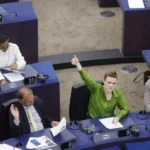The text, open for signature at the United Nations General Assembly, aims to protect 30% of seas and land by 2030.
The High Seas Biodiversity Treaty has just taken a decisive step forward during the United Nations General Assembly meeting in New York. The States responded to the organization’s invitation to come and sign this text from September 20 to 22. Sixty commitments are required for this legally binding international agreement to ultimately enter into force. At the end of the first day of signatures, he had collected 68, including those from the United States, China, Australia and the European Union, but without Russia for the moment.
The governments of the signatory states will now have to ratify this international treaty, the first text in the world to impose the conservation and management of biodiversity outside areas not falling under national jurisdiction, which includes both protection measures, including the creation of marine protected areas (MPAs), and sharing of benefits from its resources.
“We are convinced that it is our ethical duty towards future generations and our planet to ensure the ratification of this instrument as soon as possible, in order to start building a network of MPAs in [these] areas. They are needed urgently to improve the health of the ocean and safeguard global biodiversity,” said Arnoldo André Tinoco, Minister of Foreign Affairs of Costa Rica. This country is organizing with France – which is among the very first signatories – the holding of the next UN conference on the ocean, in Nice, in June 2025.
This article is originally published on lemonde.fr







